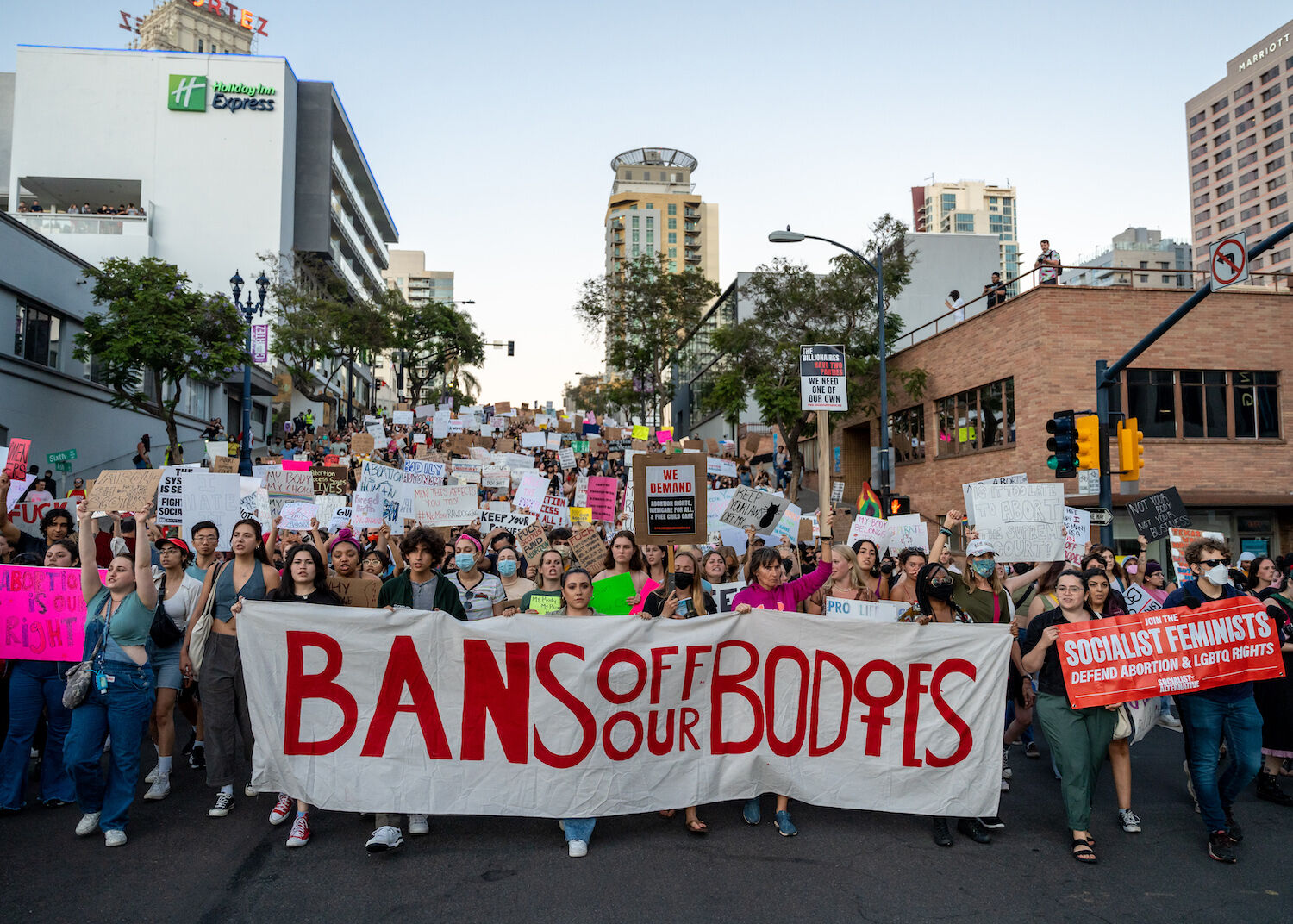
San Diegans take to the streets on Friday, June 24, 2022 to protest the overturning of Roe v Wade
Joe Orellana
The following is a well-researched op-ed written by Digital Editor, Nicolle Monico, on a timely subject. San Diego Magazine covers food, music, art, and culture. We will continue to do that. However, as a media company, we will occasionally cover more substantive issues that impact the San Diego community. This is one of those moments. — Claire Johnson, CEO
The Research That Shaped My View on Abortion
I grew up in a conservative, faith-based household and was anti-abortion most of my young adult life. Today I’m pro-choice. It’s not that my religious beliefs have drastically changed, because they have not. However, I’m passionate about a woman’s right to choose because I fundamentally don’t believe any religious beliefs should dictate what rights are afforded to any other human.
The Supreme Court’s decision to overturn Roe v Wade on June 24 is a devastating blow to human rights in this country. As a Latina and first-generation child, it is impossible to ignore how the decision will disproportionately impact already marginalized communities.
Unfortunately, this decision isn’t solely about our reproductive rights or responsibilities. If the court were concerned strictly with rights and responsibilities of reproduction, we wouldn’t live in a country where:
- Mothers have to pay $10,000+ to give birth
- National paid parental leave doesn’t exist
- Fathers are not held financially responsible for their children unless they are married to their spouse
- There is little-to-no subsidized or free childcare
- Mental health resources were rare for mothers re-entering the workforce post-birth
One of best ways to reduce the need for abortions is through accessible healthcare. In a country that lacks easy access to free or affordable birth control, where the maternal mortality rate is frighteningly high—especially for Black women who are 2.9 times more likely to die than non-Hispanic White women—Friday’s decision was a direct attack on our human rights.
Because let’s be clear, this does not end abortions. This only ends safe abortions performed by licensed medical professionals.
In 2019, the abortion rate per 1,000 women was:
- 6.6 among White women
- 11.7 among Hispanic women
- 23.8 among Black women
The higher rates among people of color is often due to a lack of access to and effective use of contraceptives, according to the Guttmacher Institute. This is the kind of free access and education that Planned Parenthood currently affords its patients.
In May 2022, an initial draft majority opinion on Roe written by Justice Samuel A. Alito Jr., said in a footnote that, “a highly disproportionate percentage of aborted fetuses are Black.” And even those number don’t account for undocumented pregnancies. This is clearly a systemic issue.
According to a review in the Journal of Obstetrics and Gynecology, more than one-third of all pregnancies are unintended, and of those, 1 in 5 ends in abortion. Now, those women in states where abortion is outlawed will have to seek unsafe methods or travel out-of-state for the procedure.
Yet, many low-income women can’t afford to travel to a state where abortion is legal. Or they may be stuck in domestic abuse relationships in which they cannot escape their partners for hours at a time.
New research from CU Boulder also found, in states where individuals face greater restrictions for abortions, there have been rising rates of pregnancy-related deaths. It went on to say that a national ban on abortions would lead to a 21% increase in overall pregnancy-related deaths and a 33% increase among Black women.
Suicide has also been shown to be a leading cause of maternal death during pregnancy—with new mothers remaining at risk for up to a year after birth—according to a 2022 review in Frontiers in Psychiatry. Lack of access to abortions may also prove to be fatal for women whose partners don’t want them to remain pregnant.
According to a 2021 study published in the Journal of Obstetrics & Gynecology, U.S. women aged 10 to 44 are at an increased risk of dying by homicide simply by becoming pregnant. They are at a 16% higher rate than those who are not pregnant; and it is often due to violence by an intimate partner.
Finally, a 2012 study in the Journal of Obstetrics & Gynecology concluded that legally induced abortion is “markedly safer than childbirth,” and the mortality rates of mothers during childbirth is “approximately 14 times higher than that with abortion.”
We cannot say ending legal abortion is about saving human lives when so many women die during or after pregnancy. The World Health Organization (WHO) considers unsafe abortion a leading, but preventable, cause of maternal mortality. There are ways to minimize abortions without taking away human rights and a woman’s right to choose.
I took this job eager to write about fitness, mental health, travel, and all things San Diego. I still look forward to doing so. But Friday’s decision to strip this fundamental right away from women was an urgent call to use my skills and spread knowledge.
This is about our people, the more than 706,000 women who make up San Diego’s population. And it’s about the 167 million women in this country who officially have less freedom to make choices about their health and their own bodies than their mothers did.
California remains a state where abortion is legal, for now. “With today’s Supreme Court decision to endanger the health and safety of millions of women across the country, California must do everything it can to protect the fundamental rights of all women—in California and beyond,” said Governor Gavin Newsom in a press conference on Friday.
“We know that states like Missouri are already targeting women seeking abortions in states like California where abortion remains legal. This legislation seeks to protect women and care providers from civil liability imposed by other states, and sends a clear message that California will continue to be a safe haven for all women seeking reproductive health care services in our state.”
However, it’s entirely plausible that a national ban on abortions could go into place. In other states where abortion became illegal in the last few days, thousands of women who had already made the painstaking decision to terminate their pregnancies had their appointments cancelled. Some were already in the waiting room of the clinic when the news was announced.
The California-based Planned Parenthood affiliates are preparing for an influx of women seeking safe abortions from other states. If you agree this should be supported, you can donate to them here. Or view this list of other reputable organizations that can help support women, and especially Black women and those of color, retain their reproductive rights.
Read the full decision by the Supreme Court here.
PARTNER CONTENT




















